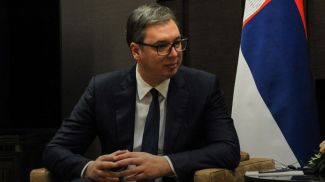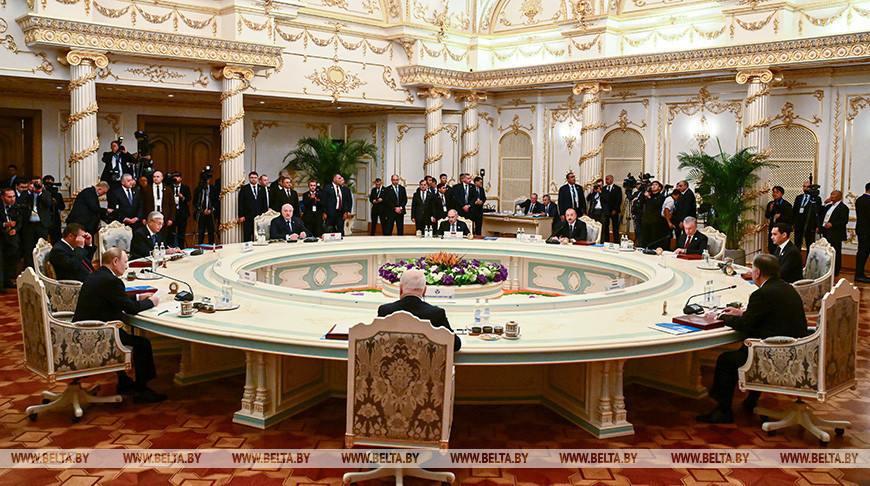
DUSHANBE, 10 October (BelTA) – Belarusian President Aleksandr Lukashenko outlined the strategic directions for the activities of the CIS as he spoke at a narrow-format meeting of the CIS Heads of State Council on 10 October, BelTA has learned.
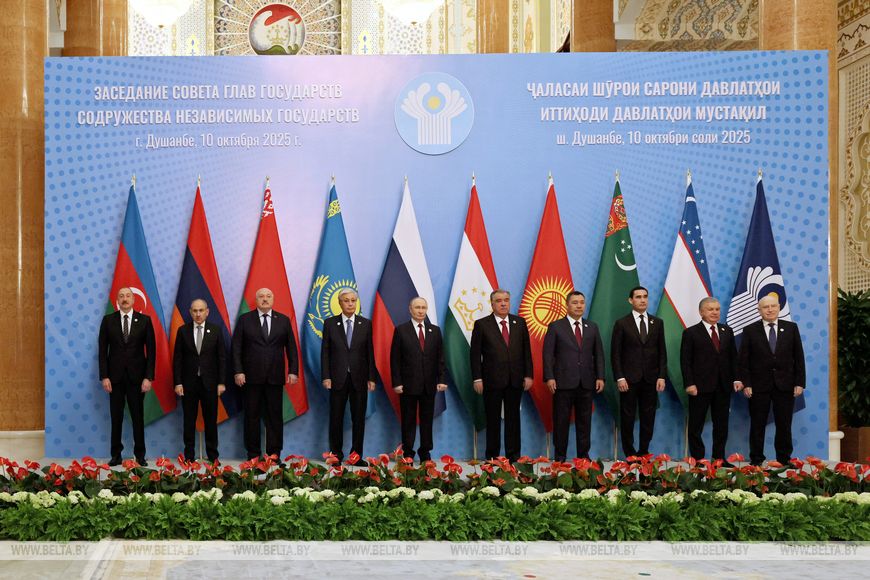 Components of national security for each CIS state and the CIS as a whole
Components of national security for each CIS state and the CIS as a whole
“Countering terrorism, strengthening border security, and combating transnational crime have long ceased to be tasks for individual agencies. They have become components of the national security of each CIS state,” Aleksandr Lukashenko said. According to the president, the meeting's extensive agenda is direct confirmation that modern threats affect everyone.
“We are witnesses to and participants in tectonic geopolitical shifts. For some, they mean a difficult and bitter recalibration of ambitions to match real capabilities. For our Eurasia, however, they are a necessary, albeit painful, stage on the path to a growing global role and the strengthening of its status as one of the most important political and economic centers of a multipolar world,” the Belarusian leader emphasized.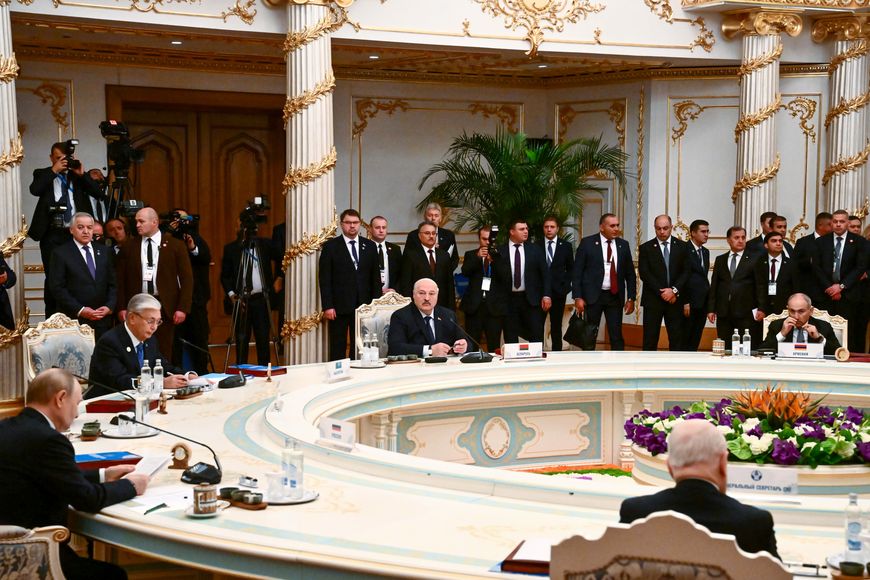 He expressed confidence that common challenges demand the highest level of coordination and the full use of the CIS's potential. “Therefore, our goal today is not only to identify risks and analyze opportunities, but to develop specific, practically viable mechanisms for interaction,” the head of state added.
He expressed confidence that common challenges demand the highest level of coordination and the full use of the CIS's potential. “Therefore, our goal today is not only to identify risks and analyze opportunities, but to develop specific, practically viable mechanisms for interaction,” the head of state added.
Security and peace as the top priority
“I would like to draw attention to several key strategic directions in the work of our organization. The absolute priority is to ensure security and preserve peace in the CIS. We must prevent the CIS states from being drawn into dangerous adventures that threaten both our region and humanity as a whole,” the head of state said.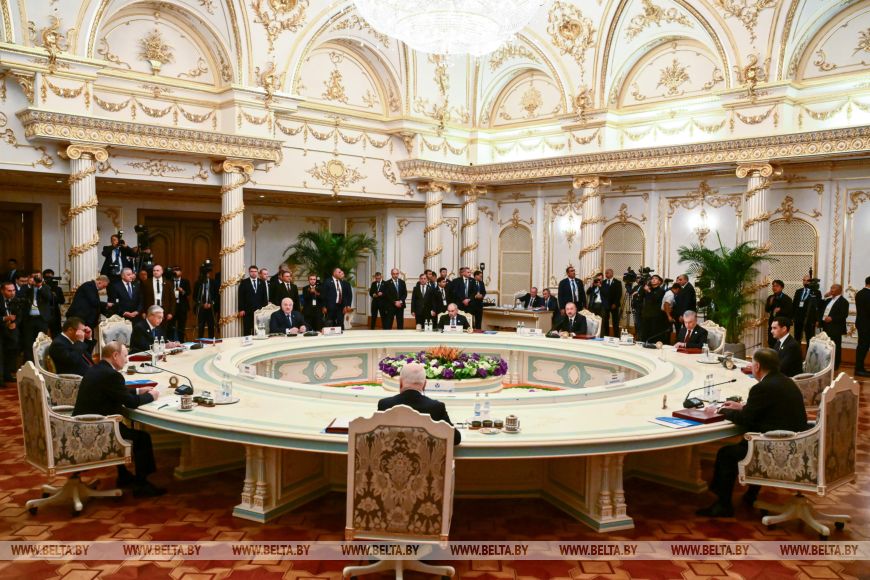 Aleksandr Lukashenko stressed that the CIS sectoral councils operating in the field of security respond promptly to emerging challenges and threats. “On their initiative, today we will adopt very important decisions and documents, including a cooperation program to counter terrorism and extremism for 2026-2028, a program to strengthen border security along the external frontiers for 2026-2030, and a concept of military cooperation until 2030,” he added.
Aleksandr Lukashenko stressed that the CIS sectoral councils operating in the field of security respond promptly to emerging challenges and threats. “On their initiative, today we will adopt very important decisions and documents, including a cooperation program to counter terrorism and extremism for 2026-2028, a program to strengthen border security along the external frontiers for 2026-2030, and a concept of military cooperation until 2030,” he added.
“We are looking forward to the active participation of your delegates in the upcoming third Minsk International Conference on Eurasian Security scheduled for the end of October,” the president said.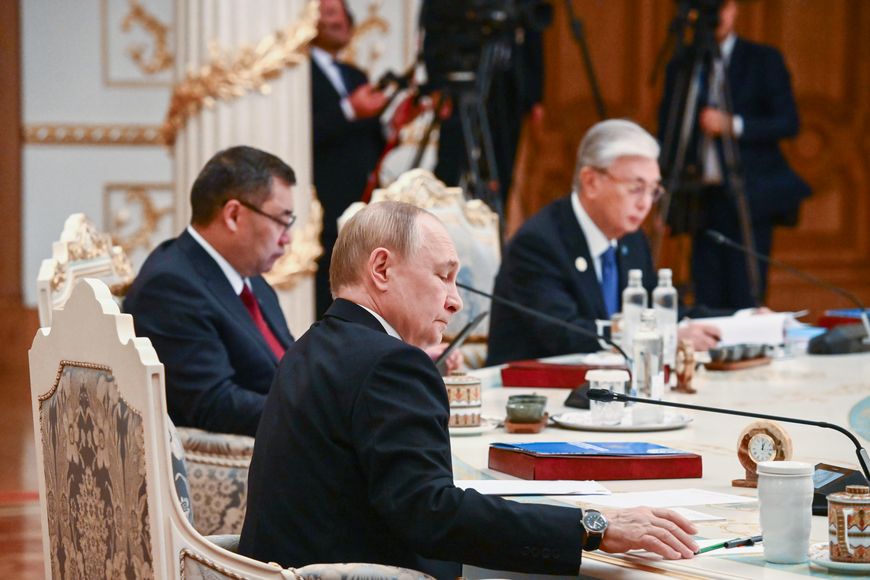 The need to build up economic resilience of CIS countries
The need to build up economic resilience of CIS countries
“In today’s world, economics and competition are the driving forces behind most, if not all, conflicts. To win this struggle and secure sustainable development and a prosperous future for all of our countries, we have no choice but to reinforce our economic foundations and deepen our cooperation in trade, investment, and manufacturing,” Aleksandr Lukashenko said.
“We must not squander the legacy built by previous generations of our people. Let us see each other as partners and pursue deeper cooperation with no topics off the table,” the Belarusian leader said.
The head of state noted that despite “frantic sanctions pressure from the West” and attempts to drive a wedge between CIS countries through threats of secondary sanctions, the Commonwealth has maintained economic growth this year, recording a rate of 2.2% for January-July.
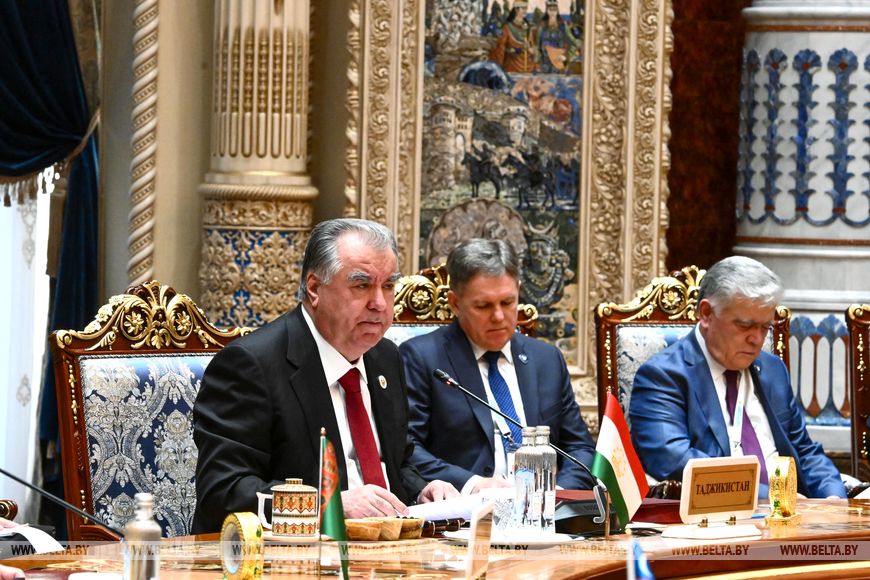
That said, Aleksandr Lukashenko emphasized the need to build up economic resilience, reiterating his thesis that the economy is of paramount importance. “Invariably, our discussions circle back to the same thing: our joint economic activity on the common market of the [former] Soviet Union. This is not about returning to the system that existed in the Soviet Union. The common market was enormous. Maybe we should just drop all these convoluted discussions and finally get down to economic matters, considering what every one of us actually needs?” the president asked.
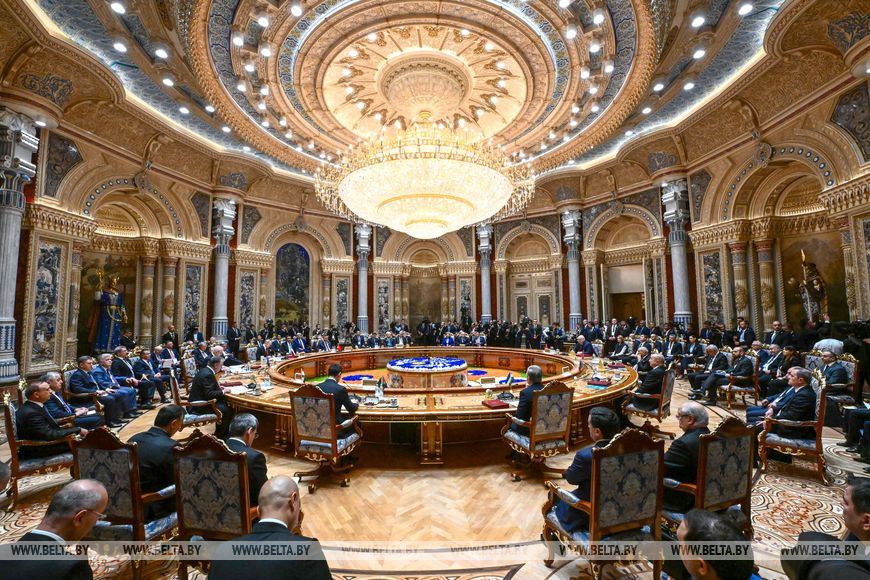
Aleksandr Lukashenko expressed confidence that, with a common strategy, it would be possible to restore this economic space taking into consideration the interests of all the countries and to improve coordination in international trade and economic cooperation. He stressed, however, that the ambitions of each CIS state should not be undermined under any circumstances. “But this must begin now,” the Belarusian leader stated.
Furthermore, the president welcomed the meeting’s adoption of a declaration on cooperation in ensuring regional energy security. He also recalled that an action plan for implementing the CIS Economic Development Strategy until 2030 was approved in Minsk on 29 September.
Strengthening the CIS's authority on the international stage
Aleksandr Lukashenko identified the strengthening of the CIS's authority and its positioning on the international stage as one of the strategic directions for the organization. “The intensification of integration among Eurasian states and the growing interest from third countries in cooperation with our common structures are becoming a lasting trend,” the president said.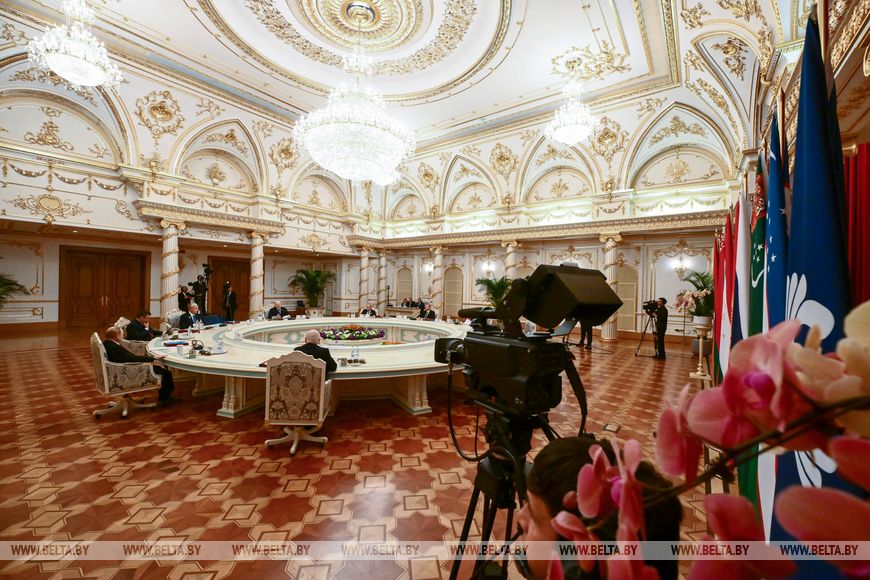 “Just look at the progress the Shanghai Cooperation Organization has made in this regard, and the results achieved by the EAEU,” he emphasized. “The CIS also needs to strengthen interaction with like-minded countries and organizations to promote a coordinated international agenda and to defend our approaches and values.”
“Just look at the progress the Shanghai Cooperation Organization has made in this regard, and the results achieved by the EAEU,” he emphasized. “The CIS also needs to strengthen interaction with like-minded countries and organizations to promote a coordinated international agenda and to defend our approaches and values.”
The Belarusian leader believes it would be in their common interest to grant the SCO observer status within the CIS. The president of Belarus fully supported the initiative of the president of Kazakhstan to establish a CIS Plus format.
Preserving traditions of intercultural communication and humanitarian cooperation
According to the president, the fourth strategic direction is preserving the traditions of intercultural communication and humanitarian cooperation. He noted that this year the CIS has successfully held events dedicated to the 80th anniversary of the Victory over fascism, including the establishment of the CIS honorary title “City of Labor Glory. 1941-1945”. “Belarusian cities of Baranovichi and Orsha were awarded this title,” he added.
The president recalled that the year 2026 will mark 40 years since the Chernobyl nuclear accident, one of the worst man-made disasters in human history. He emphasized that this topic has been addressed in a CIS statement as well as in a resolution on Chernobyl adopted at the 80th session of the UN General Assembly.
In conclusion, the head of state said that Belarus praises Tajikistan’s chairmanship of CIS bodies in 2025. Taking the opportunity, Aleksandr Lukashenko expressed gratitude to President Emomali Rahmon of Tajikistan for his hospitality, and to the CIS Executive Committee for the high level of preparation of the current events.
The Belarusian leader also congratulated President Serdar Berdimuhamedov of Turkmenistan on assuming the CIS chairmanship. Aleksandr Lukashenko assured Serdar Berdimuhamedov that Turkmenistan can count on Belarus’ support.
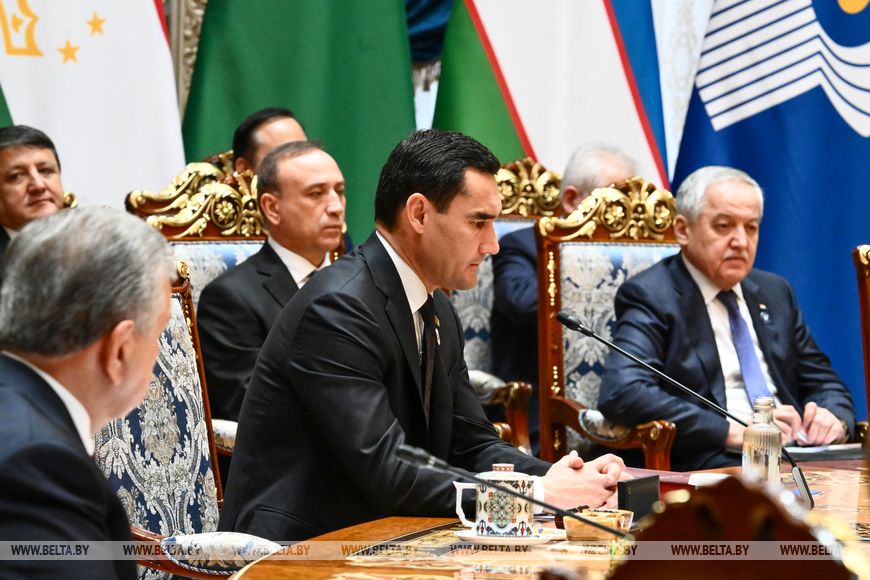
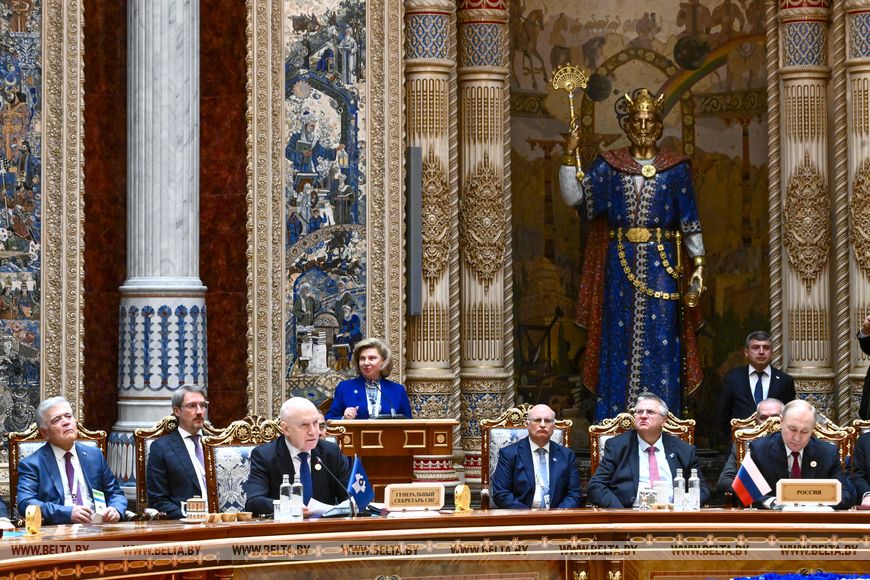

“Countering terrorism, strengthening border security, and combating transnational crime have long ceased to be tasks for individual agencies. They have become components of the national security of each CIS state,” Aleksandr Lukashenko said. According to the president, the meeting's extensive agenda is direct confirmation that modern threats affect everyone.
“We are witnesses to and participants in tectonic geopolitical shifts. For some, they mean a difficult and bitter recalibration of ambitions to match real capabilities. For our Eurasia, however, they are a necessary, albeit painful, stage on the path to a growing global role and the strengthening of its status as one of the most important political and economic centers of a multipolar world,” the Belarusian leader emphasized.
 He expressed confidence that common challenges demand the highest level of coordination and the full use of the CIS's potential. “Therefore, our goal today is not only to identify risks and analyze opportunities, but to develop specific, practically viable mechanisms for interaction,” the head of state added.
He expressed confidence that common challenges demand the highest level of coordination and the full use of the CIS's potential. “Therefore, our goal today is not only to identify risks and analyze opportunities, but to develop specific, practically viable mechanisms for interaction,” the head of state added.
Security and peace as the top priority
“I would like to draw attention to several key strategic directions in the work of our organization. The absolute priority is to ensure security and preserve peace in the CIS. We must prevent the CIS states from being drawn into dangerous adventures that threaten both our region and humanity as a whole,” the head of state said.
 Aleksandr Lukashenko stressed that the CIS sectoral councils operating in the field of security respond promptly to emerging challenges and threats. “On their initiative, today we will adopt very important decisions and documents, including a cooperation program to counter terrorism and extremism for 2026-2028, a program to strengthen border security along the external frontiers for 2026-2030, and a concept of military cooperation until 2030,” he added.
Aleksandr Lukashenko stressed that the CIS sectoral councils operating in the field of security respond promptly to emerging challenges and threats. “On their initiative, today we will adopt very important decisions and documents, including a cooperation program to counter terrorism and extremism for 2026-2028, a program to strengthen border security along the external frontiers for 2026-2030, and a concept of military cooperation until 2030,” he added.
“We are looking forward to the active participation of your delegates in the upcoming third Minsk International Conference on Eurasian Security scheduled for the end of October,” the president said.
 The need to build up economic resilience of CIS countries
The need to build up economic resilience of CIS countries
“In today’s world, economics and competition are the driving forces behind most, if not all, conflicts. To win this struggle and secure sustainable development and a prosperous future for all of our countries, we have no choice but to reinforce our economic foundations and deepen our cooperation in trade, investment, and manufacturing,” Aleksandr Lukashenko said.
“We must not squander the legacy built by previous generations of our people. Let us see each other as partners and pursue deeper cooperation with no topics off the table,” the Belarusian leader said.
The head of state noted that despite “frantic sanctions pressure from the West” and attempts to drive a wedge between CIS countries through threats of secondary sanctions, the Commonwealth has maintained economic growth this year, recording a rate of 2.2% for January-July.

That said, Aleksandr Lukashenko emphasized the need to build up economic resilience, reiterating his thesis that the economy is of paramount importance. “Invariably, our discussions circle back to the same thing: our joint economic activity on the common market of the [former] Soviet Union. This is not about returning to the system that existed in the Soviet Union. The common market was enormous. Maybe we should just drop all these convoluted discussions and finally get down to economic matters, considering what every one of us actually needs?” the president asked.

Aleksandr Lukashenko expressed confidence that, with a common strategy, it would be possible to restore this economic space taking into consideration the interests of all the countries and to improve coordination in international trade and economic cooperation. He stressed, however, that the ambitions of each CIS state should not be undermined under any circumstances. “But this must begin now,” the Belarusian leader stated.
Furthermore, the president welcomed the meeting’s adoption of a declaration on cooperation in ensuring regional energy security. He also recalled that an action plan for implementing the CIS Economic Development Strategy until 2030 was approved in Minsk on 29 September.
Strengthening the CIS's authority on the international stage
Aleksandr Lukashenko identified the strengthening of the CIS's authority and its positioning on the international stage as one of the strategic directions for the organization. “The intensification of integration among Eurasian states and the growing interest from third countries in cooperation with our common structures are becoming a lasting trend,” the president said.
 “Just look at the progress the Shanghai Cooperation Organization has made in this regard, and the results achieved by the EAEU,” he emphasized. “The CIS also needs to strengthen interaction with like-minded countries and organizations to promote a coordinated international agenda and to defend our approaches and values.”
“Just look at the progress the Shanghai Cooperation Organization has made in this regard, and the results achieved by the EAEU,” he emphasized. “The CIS also needs to strengthen interaction with like-minded countries and organizations to promote a coordinated international agenda and to defend our approaches and values.”
The Belarusian leader believes it would be in their common interest to grant the SCO observer status within the CIS. The president of Belarus fully supported the initiative of the president of Kazakhstan to establish a CIS Plus format.
Preserving traditions of intercultural communication and humanitarian cooperation
According to the president, the fourth strategic direction is preserving the traditions of intercultural communication and humanitarian cooperation. He noted that this year the CIS has successfully held events dedicated to the 80th anniversary of the Victory over fascism, including the establishment of the CIS honorary title “City of Labor Glory. 1941-1945”. “Belarusian cities of Baranovichi and Orsha were awarded this title,” he added.
The president recalled that the year 2026 will mark 40 years since the Chernobyl nuclear accident, one of the worst man-made disasters in human history. He emphasized that this topic has been addressed in a CIS statement as well as in a resolution on Chernobyl adopted at the 80th session of the UN General Assembly.
In conclusion, the head of state said that Belarus praises Tajikistan’s chairmanship of CIS bodies in 2025. Taking the opportunity, Aleksandr Lukashenko expressed gratitude to President Emomali Rahmon of Tajikistan for his hospitality, and to the CIS Executive Committee for the high level of preparation of the current events.
The Belarusian leader also congratulated President Serdar Berdimuhamedov of Turkmenistan on assuming the CIS chairmanship. Aleksandr Lukashenko assured Serdar Berdimuhamedov that Turkmenistan can count on Belarus’ support.






